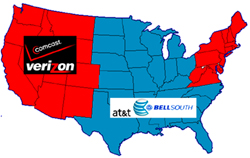
Remember the old Ma Bell, AT&T? Before the 1980s we pretty much all had the same phone company and one long distance company with pretty high rates. You could only get your phone from the phone company, and this monopoly was protected by the federal government.
That looks like the current dream of the new AT&T–formerly SBC–except for the part where the protected monopoly had public service obligations.
According to today’s New York Times, AT&T is close to sealing a deal to buy BellSouth, one of the last four remaining regional telephone companies in the US:
AT&T is expected to pay about $65 billion for BellSouth, the country’s third largest phone company, which operates in a nine-state region in the Southeast. The price represents a 25 percent to 30 percent premium for BellSouth shareholders.
The combined company would have more than $125 billion in sales, 70 million local-line phone customers and nearly 10 million broadband subscribers.
Like nature abhors a vaccuum, a capitalist abhors actual competition, and the voracious apetite of SBC/AT&T is strong evidence for that. If regulators let AT&T roll over them and approve this deal, it won’t be long before the nation’s largest telecom behemoth will be licking its lips over Verizon or Qwest, plotting a nationwide fiefdom.
 This threat will probably just spur more consolidation across telephone and cable, such as forcing Comcast to link up with Verizon. The result likely will be even fewer companies controlling all of television, data and telecommuncations services, consolidated across industries, carving up the country into territories each with a communications monopoly.
This threat will probably just spur more consolidation across telephone and cable, such as forcing Comcast to link up with Verizon. The result likely will be even fewer companies controlling all of television, data and telecommuncations services, consolidated across industries, carving up the country into territories each with a communications monopoly.
And yet, this is the same AT&T that keeps crying that it can’t afford to roll out high-bandwidth broadband internet without charging content providers or giving preference to the company’s own content. Yet, even after the expensive merger, the combined SBC/AT&T saw a net income of $4.7 billion last year [link to PDF earnings statement].
So AT&T has plenty of cash on hand to go on a $65 billion spending spree, but it doesn’t have the capital to provide the level of broadband service it’s been promising since 1996?
In a press release, the Center for Digital Democracy’s Jeff Chester draws a direct connection between the planned AT&T-Bell South deal and the FCC’s effective deregulation of internet services:
This proposed merger is the direct result of a recent FCC decision that eliminated long-standing safeguards for the Internet. AT&T can now operate its broadband platform (as well as its new digital TV service) as a privately controlled highway. Instead of the Internet reflecting what the federal courts not long ago called “the most participatory form of mass speech yet developed,” it’s now threatened to be reduced to what AT&T called its private “pipes.”
The big telephone companies argue that if they can’t charge content providers to reach subscribers’ internet connections then they’ll have to raise rates for consumers. I bet rates will go up regardless, to help finance these acquisitions, which will allow them to eliminate competition, thereby eliminating any pressure or incentive not to raise rates.
The doesn’t have to happen, but it will if we just lie back and watch the binge.
Leave a Reply